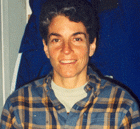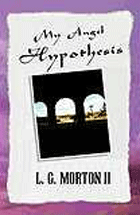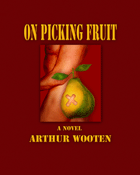 John
Charles, our New York IGW editor has contributed two reviews for
this issue, as different as Manhattan and Las Cruces. The first is My Angel Hypothesis and the other is
On Picking Fruit (don't
you just love it when glbt writers use the old bad words and turn them
into something clever and fun?) contact.
John
Charles, our New York IGW editor has contributed two reviews for
this issue, as different as Manhattan and Las Cruces. The first is My Angel Hypothesis and the other is
On Picking Fruit (don't
you just love it when glbt writers use the old bad words and turn them
into something clever and fun?) contact.  My Angel Hypothesis My Angel Hypothesisby L.G. Morton II Xlibris ISBN: 1-4134-5900-5 Right out of the gate, the first comment that must be made about L.G. Morton’s novel, My Angel Hypothesis, is that it’s a deeply moving and truly outstanding work, a tour-de-force of creative writing that leaves the reader wondering, “Is this really a work of fiction, or is it more?” It reads more like a real journal depicting one man’s passage through life; in addition, there are striking similarities between the author and the author’s character, Andy. Since the author has presented his work as one of fiction, the reader must accept it as such, and credit the book’s realism and journalistic voice to the skills of the author. The bottom line is that aside from piquing one’s curiosity, the book’s status as fact or fiction doesn’t change the quality of this work. My Angel Hypothesis, chronicles Andy Martin’s awakening to his homosexual nature after his loveless marriage ends in divorce, the sole reason for the marriage having been his high school girlfriend’s pregnancy. Although the marriage was contentious for both Andy and his wife, it comes as a surprise for Andy when his wife files for divorce; he flounders, devastated in its aftermath. Mulling over his options, the strongest contender being suicide, a female co-worker entices him out for a night on the town. Towards the end of the evening, they enter a bar to use the restrooms, and when they do, life as Andy has known it, ends. The bar he and his female companion have inadvertently entered is a gay bar. To that point, Andy has not consciously acknowledged an attraction to men, although we later find out that the clues were there for him all along. In any event, on this night, Tysin steps into Andy’s life. Young, handsome, magnetic, he touches Andy on the shoulder, offers him a drink, and sets in motion events that change the course of Andy’s life. Not understanding what it is he’s feeling, what Andy does know is that his attraction to Tysin is unlike any he’s experienced before, and not least of all because Tysin is another man. The attraction is an electric, sexually explosive, unfathomable experience for Andy. He is besotted with Tysin who, although desired by many, has chosen Andy. For this, Andy thanks what he calls the good God, the God who orchestrates all positive things for Andy. His natural counterpart is the bad God, who Andy comes to hold responsible for all the pain and trauma he experiences in life. This fractured way of seeing the world and God reflect Andy himself. He is fractured by his desire to be a good father to the son he loves, and his perception that he isn’t, by his desire to be more giving to others and less concerned with his own well-being and his inability to do so. He comes to see himself as a man who is selfish and self-serving, hurting those around him, yet failing (or not wanting) to change. He comes to equate himself as a doormat before his realization that he’s gay, and then (he feels) justifiably placing his own needs above others’ afterwards; he doesn’t seem able to integrate his needs with the needs of others. Not happy with himself, Andy continues on his course nonetheless. Tysin is the love of Andy’s life and its sole focus, the source of his deepest pain and his deepest joy; all else is secondary. From the outset, Tysin is an enigma. He lives haphazardly from one day to the next, living in near squalor in a rented apartment. He tends bar at the place where Andy finds him during their first encounter, but can and does disappear for days and weeks at a time, telling Andy that this is how he is, and that to be with him, Andy must accept this. Tysin is more secretive than free-living, and exhibits personality traits that Andy finds disturbing. It’s understood by both of them that Tysin will leave Andy someday, and that he will do so without notice. The dread of that day weighs heavily on Andy, but he comes to accept it with an uneasy peace and feeling of resignation. When he asks Tysin why he chose him, Tysin explains that he is to be Andy’s teacher. The implication is that his intention is to teach Andy how to love another man, physically and emotionally, and he does indeed do this, but there’s more depth to what he teaches Andy. Andy himself doesn’t fully grasp this until years later. Placing himself in the role of teacher, Tysin unexpectedly comes to realize that Andy also has things to offer him that he wants and needs. Their expected few weeks together become much longer. Tysin’s seemingly magical appearance in Andy’s life combined with the mystery surrounding him, and Andy’s awakening to who and what he was destined to be, under Tysin’s tutelage combine to make Andy believe that Tysin is, in fact, an angel. Although Andy knows from the beginning that the day will come when Tysin will disappear from his life, when the day comes, it’s a catastrophic blow of such devastating proportions that even Andy could not have foreseen his response. Months later, Andy has accepted that he must move on with his life and meets Marc. After a brief time dating, they move in together, and if the electric chemistry that Andy and Tysin shared is lacking, the life that Marc and Andy share is satisfying and comfortable--but unequal. Marc is deeply committed to Andy and their relationship; Andy is not. He’s still deeply in love with Tysin, whose shadow is cast over the relationship between Marc and Andy. When their relationship reaches a critical point and must either move forward or end, Tysin suddenly reappears in Andy’s life, although in a way Andy never envisioned. Once again, Tysin is a catalyst for Andy’s growth. This time it’s not Andy’s growth as a gay man, but simply his growth as a man. Tysin’s return comes at a point in Andy and Marc’s relationship when they’re at a crossroads; again, Tysin becomes the vehicle for growth and change in Andy in ways neither of them could have foreseen. Whether this is, in fact, a work of fiction or autobiography, the chronicle of one man’s awakening to his nature and his process of coming to understand that that isn’t all there is to becoming the man he ultimately wants to be is profoundly moving. Revealing Andy’s flaws and foibles as well as his humanity presents him as a multi-faceted, believable, and sympathetic character. While Andy does not describe his view of the good and bad aspects of God as ‘fractured,’ nor does he describe himself in that way, his life is, in a sense, an effort to mend those splintered parts, to see the grays in life, rather than in the simplistic blacks and whites that he always has. Tysin is the common thread that runs throughout it all and the catalyst who can make all those fractured parts of Andy whole. The only caveat that must be mentioned in this otherwise outstanding work is that there are typographical errors throughout the book, and while they aren’t glaring, they are a bit of a distraction. In addition, the font size is extremely small, making it difficult to read. That said, those are the only negative criticisms to be made about My Angel Hypothesis, and neither issue prevented a read-through from beginning to end in one sitting; the story is so compelling that it overcomes the minor difficulties found in the practicalities of reading the book. Morton has crafted a deeply moving and thought provoking work with multi-layered characters that lend credibility to My Angel Hypothesis. Readers should be prepared for an honest and at times emotionally difficult book to read. When the last page is turned, one comes to understand that the rare angels who do indeed walk among us are beings not so easily distinguished FROM us. Indeed, Morton quotes the Hebrew Bible at the beginning of the book: “Do not forget to entertain strangers, for by so doing some people have entertained angels…” |
  On Picking Fruit On Picking Fruitby Arthur Wooton iIniverse ISBN 0-595-34607-3 On Picking Fruit is a light, satirical work depicting Curtis Jenkins’ search for love in New York City. The story opens with Curtis’s apparent suicide attempt with an overdose of Beano. To meet the conditions for his release from the hospital, Curtis must agree to enter into counseling. Curtis’s best friend, Quinn Larkin, who has flown in from Los Angeles to be at his friend’s side in his moment of need, recommends his own therapist; Dr. Magna Tunick, an aging Polish woman living on Manhattan’s Upper West Side. Curtis’s mother and doctor endorse the choice and, with everything set in place, the story takes off. Quinn is Curtis’s best friend and foil, but their contacts are limited mostly to phone conversations, since they live on opposite coasts. Curtis’s mother hovers in the wings, coming into Manhattan from the New York City suburb of Westchester to support and nag at him, usually in embarrassing ways. She has boasted with pride since Curtis’s birth that “My son is gay,” and in this, as in many things, she lives firmly outside of convention. The same can be said for Dr. Tunick. When Curtis answers the question Dr. Tunick puts to him, asking him what is the thing most lacking in his life, Curtis’s response is, “A man, first and foremost a man.” To remedy this, Dr. Tunick has a set of instructions for him; to date at least one man a week and report to him in two. To this end, Curtis begins his dating quest. The rest of the story depicts Curtis’s dating adventures as he sets off on a deliberate search for the perfect man; as it turns out, they’re all a succession of misadventures. Wooton’s wit and humor make the story a funny, enjoyable read. There are several laugh-out-loud passages, resulting as much from Wooten’s humor and skill with words as Curtis’s story. He has boiled down a compilation of everyone’s worst dates and made them Curtis’s, although Curtis’s are, admittedly, a cut above the average; they all easily qualify as exercises in the bizarre and comical. Nonetheless, Curtis perseveres. By the end of the story, we have learned some very surprising things about Curtis’s mother and about Magda Tunick. We have seen the comical worst of dating and the quest for a mate. Set in New York, Wooten’s descriptions of the city and getting around in it are accurate and realistic. On Picking Fruit reads like a situation comedy, with character development as it would be in a sit-com, more as symbolic representations, or caricatures of real people. This is well suited for this book and moves it along at a brisk, humorous pace. On Picking Fruit is recommended for those looking for a funny look at a serious matter, some easy laughs, and a comical take on seeking the perfect man in New York City. |